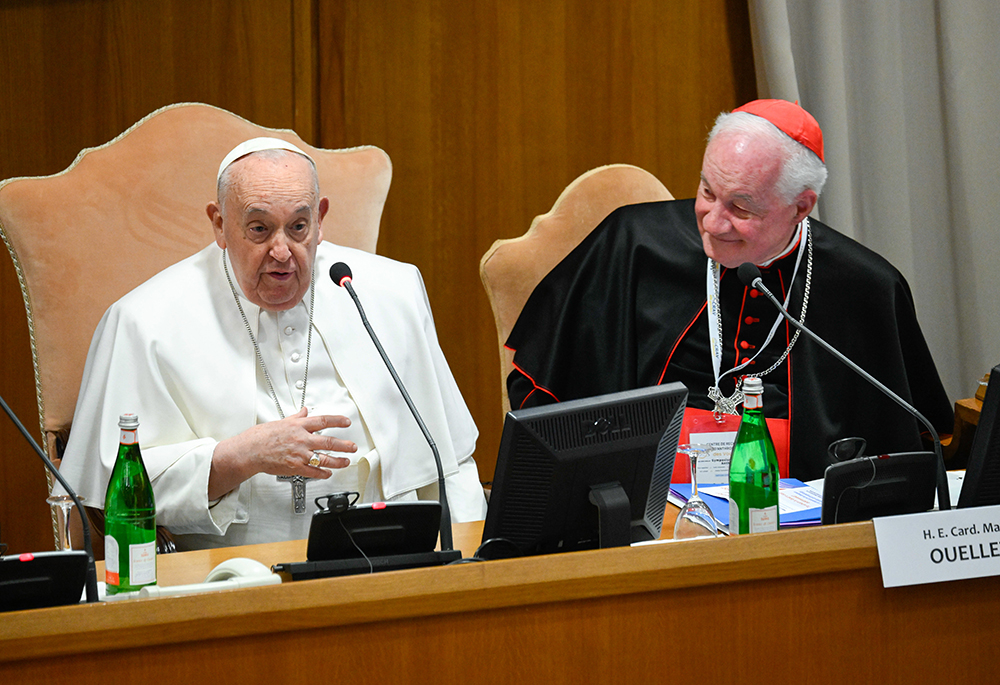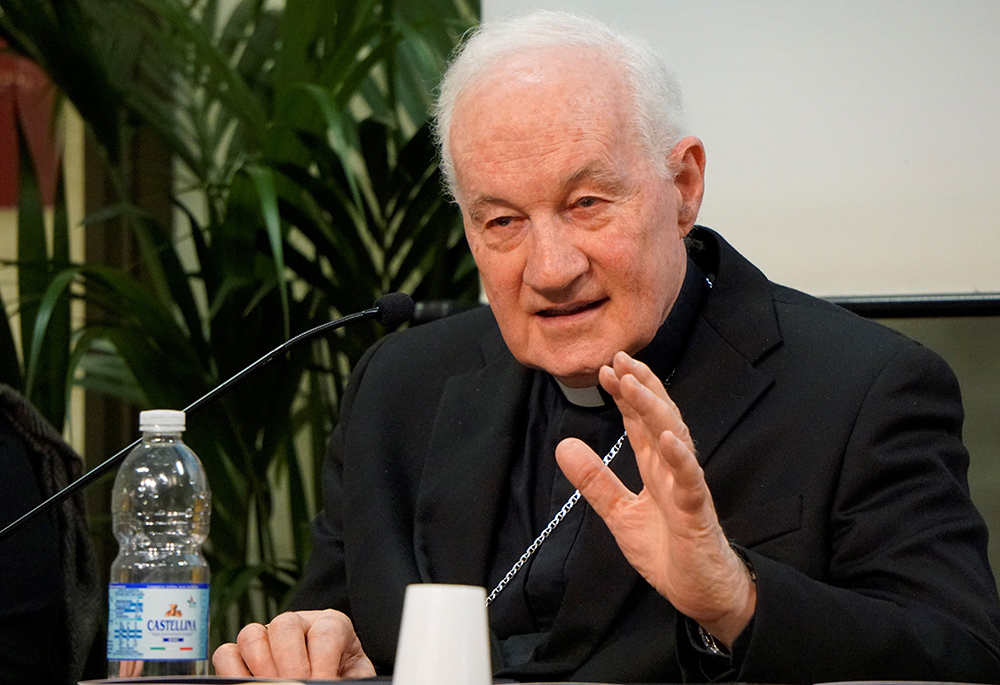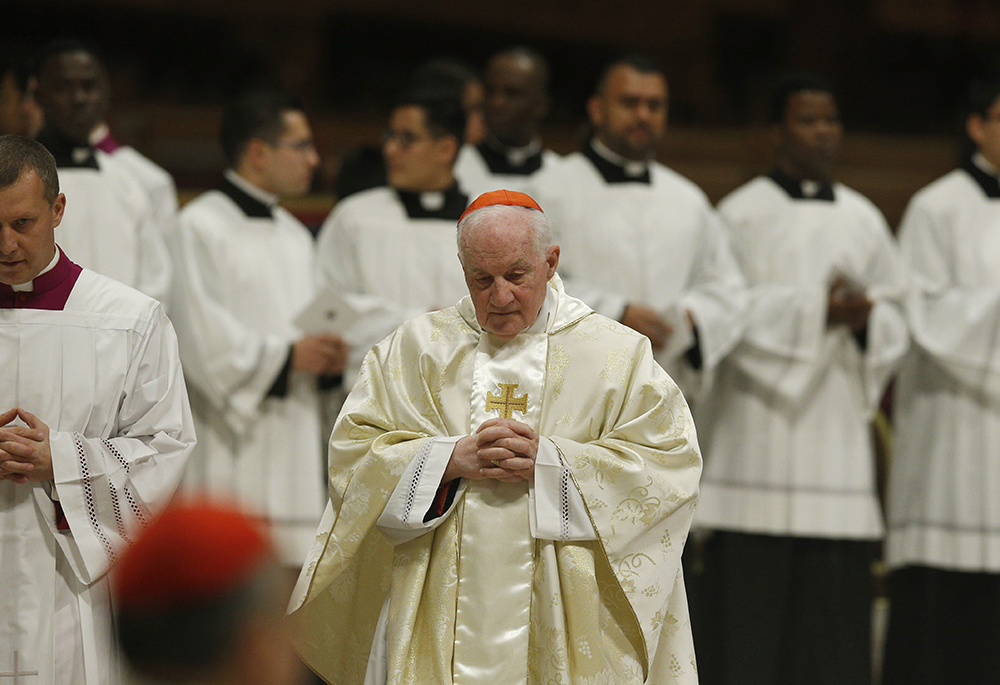
Pope Francis, seated next to Cardinal Marc Ouellet, head of the Center for Research and Anthropology of Vocations and former prefect of the Dicastery for Bishops, addresses attendees at an international congress titled, "Man-Woman: Image of God. For an Anthropology of Vocations," March 1 in the Vatican's Synod Hall. (CNS/Vatican Media)
When Canadian Cardinal Marc Ouellet turns 80 on June 8, the prelate who was touted as a potential future pope in both the conclaves of 2005 and 2013, will no longer be able to participate in the next papal election.
Ouellet, who was archbishop of Quebec from 2003-2010 and then prefect of the Vatican's Dicastery for Bishops until his retirement in 2023 at age 78, has been a pivotal player under three papacies. And in two of those he played an outsized role in shaping the Catholic hierarchy throughout the world.
The Canadian cardinal's retirement last year brought about an end to an incongruous era, where a prelate much more identified with Popes John Paul II and Benedict XVI was kept on by Pope Francis to lead the powerful Vatican office tasked with vetting potential candidates for the Catholic episcopacy.
And his 80th birthday — the age where, according to church law, cardinals lose their right to participate in a conclave — brings with it the conclusion of years of speculation about whether he himself might one day get the Catholic Church's top job, and also offers insights into Francis' own style of governance.
"Thinking politically, one would have thought Francis would have dumped this guy within the first year," said Michael Swan, former associate editor of The Catholic Register, Canada's leading Catholic newspaper.
"Clearly, he was not on the team of the 'pastoral first' papacy," Swan told the National Catholic Reporter. "But I don't think Francis necessarily thinks politically in that way. Ouellet's long tenure under Francis demonstrates that Francis refuses to go to war in the long political battles in the church."
"And to his credit, Ouellet, I think quite sincerely, did his best to be a faithful servant," he added.

Canadian Cardinal Marc Ouellet, outgoing prefect of the Dicastery for Bishops, speaks to reporters at the Vatican Feb. 20, 2023, about the release of a two-volume book on the theology of the priesthood and the need to promote a better understanding of priesthood in a "synodal" church. (CNS/Justin McLellan)
In a 2022 interview with NCR, Ouellet, an accomplished scholar in the mold of Benedict XVI, said that when he was first called to Rome to lead the then-Congregation for Bishops, he was more concerned about the doctrinal aspects of the job, and he admitted that the Francis papacy had stretched him.
"With Pope Francis, we've learned the accompaniment dimension," he said at the time. "We have learned that it's not enough to tell people what they have to do."
Looking back on nearly 10 years as one of Francis' top advisers, his record demonstrates the ways he's managed to walk a fine line representing both past and present papal regimes.
In 2018, after the now-disgraced former Vatican ambassador to the United States, Archbishop Carlo Maria Viganò, published a scathing letter accusing Francis of covering up abuse allegations against ex-Cardinal Theodore McCarrick, Ouellet penned a fiery response to Vigano charging him with carrying out a "political frame job" and labeling his actions as "extremely immoral."
Later, in 2022, when Francis revised the Vatican's organizational structure to allow for lay people to run Vatican departments, Ouellet took to the pages of the Vatican's daily newspaper, L'Osservatore Romano, to support the pope's decision with an historical analysis buttressing the pope's authority to make such a call.
At the same time, however, Ouellet has been repeatedly faulted for failing to identify and appoint bishops that reflected Francis' pastoral priorities. And ahead of the pope's highly anticipated 2019 Amazon synod — where the issue of married clergy was debated — Ouellet published a book defending clerical celibacy and voiced his skepticism about revisiting the matter. Three years later, however, when Ouellet organized a conference on the priesthood, specifically promoting clerical celibacy, Francis delivered the opening remarks.
Advertisement
"At heart, Cardinal Ouellet is an institutionalist," longtime Vatican watcher David Gibson told NCR via email. "He was raised and trained to follow the old style clerical career path — he was identified early on as very intelligent, very savvy, and very committed to preserving the stability of the old order. He is a scholar and professor, like John Paul II and Benedict XVI, the two popes who promoted him in Canada and at the Vatican. And he has the conservative cast of mind like they did."
"But the importance of institutional loyalty and stability also led him to support, at least publicly, the very different approach of Francis, the third pope he served under," said Gibson, who is the director of Fordham University's Center for Religion and Culture.
While Ouellet's reflexes as a company man has allowed him to survive in the Francis era, Gibson believes "his heart was never really in it."
"He knows how to talk the talk, but he isn't so good at walking the walk," he said. "He just doesn't have a pastoral personality."
Back home in his native Canada, Swan said that most Catholics have little knowledge of one of their church's highest ranking churchmen, but that recent sexual assault allegations against Ouellet from his time leading the Quebec Archdiocese is a reminder of the fact that Canada was ground zero for the clergy abuse crisis, beginning in the 1970s.
Ouellet has strongly denied the accusations — even taking the rare step of suing the woman who brought the case against him — but Swan said that the entire ordeal is a reminder to most Canadians of "the whole avalanche of abuse stories that are a part of the Catholic identity."
In Swan's view, both in Canada and in Rome, Ouellet has been a relic of past eras.

Cardinal Marc Ouellet, prefect of the Dicastery for Bishops, attends Pope Francis' celebration of Mass marking the feast of Our Lady of Guadalupe in St. Peter's Basilica Dec. 12, 2022, at the Vatican. (CNS/Paul Haring)
In his native Quebec, Ouellet had a reputation for being closely allied with what Swan described as "militant" pro-life groups and pining for a bygone age before the province's rapid secularization where there was greater religiosity, leading to stances that often put him at odds with other Quebec bishops. And in Rome, he's proven an unusual fit for an era where the emphasis has been on synodality, fighting clericalism and elevating the role of the laity.
Even so, Gibson said he's not surprised that Francis opted to keep Ouellet on the job for so long.
"Despite the silly assertion of Francis as a 'dictator,' he is far more inclined to let people stay in place," said Gibson. "Francis is also quite savvy and saw how any move he made that seemed to replace a Benedict loyalist was greeted with howls of outrage, so best to let Ouellet be."
But that calculation is a long term bet that may have ramifications that last well after the cardinal's 80th birthday and his influence could still be felt even without him sitting in the Sistine Chapel during the next conclave.
Francis, said Gibson, "let a cardinal who does not always share his pastoral and synodal approach be the gatekeeper for the appointment of bishops around the world who will be the ones to implement the Francis legacy — or not."








